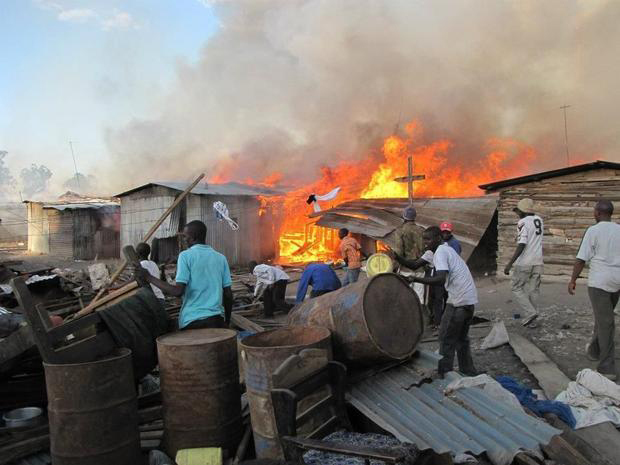Fire alarm shows early success
19 May 2015 | Story by Newsroom
"Hundreds homeless as fire ravages informal settlement." It's an all-too common headline in South Africa.
An engineering Honours thesis by UCT graduate Francois Petousis gave rise to a fire detector, designed and distributed by technology start-up Lumkani. The fires that decimated shacks and left thousands homeless in Khayelitsha on New Year's Day in 2013 sparked the initial research, and since its development the Lumkani fire detector has now been installed in 1 200 households.
It's an early warning system. When the heat-detecting device detects a fire it sounds an alarm and triggers all devices within a 60-metre radius. This potentially allows not only the family at the epicentre to react quickly but affords the same opportunity to their neighbours.
"As at 31 January 2015, Lumkani has already detected two fires which the community has verified would have displaced many people, had the network effect of the devices not taken place, creating a community-wide response to the fire," says David Gluckman of Lumkani. "Therefore, the community is increasingly positive about the product and has an increased sense of safety."
Gluckman recalls when the first fire was detected, on 9 December last year. "We received text message alerts that the system was triggering as it sensed fire. We had detected a dangerous fire and the community had rallied together after responding to the technology alert.
"The community-wide response enabled people to get buckets of water and put out the fire before it spread to a second home. On this day, the technology had first proved itself as effective in light of the human challenge."
Urban housing is a critical challenge in sub-Saharan Africa where 72% of urban-dwelling people live in slums, says Gluckman.
"This is growing the urban slum environment and as a result the threat of rampant slum fires which entrench cycles of poverty," he adds. "Lumkani is a risk-reducing strategy that mitigates the probabilities of fire disasters which set back economies to the tune of hundreds of millions each year, and the challenge is only going to become larger and more complicated."
The device costs R120 per unit and the battery will last between one year and two years.
Lumkani initially received seed-funding from the Technology Innovation Agency through UCT. Now as part of the Chivas Regal "The Venture" campaign, the company is crowd-sourcing funds on Indiegogo from individuals all over the world. They are hoping to raise US$45,000 for 3 000 fire detectors to be distributed to 3 000 households across South Africa. Interested parties can make a contribution.
As part of the same campaign, for five weeks, starting 11 May, Chivas Regal will be giving a share of US$250 000 to the social enterprise with the highest votes. You can vote for Lumkani.
Story by Yusuf Omar. Image supplied.
 This work is licensed under a Creative Commons Attribution-NoDerivatives 4.0 International License.
This work is licensed under a Creative Commons Attribution-NoDerivatives 4.0 International License.
Please view the republishing articles page for more information.










